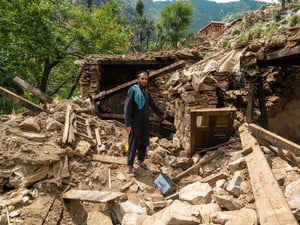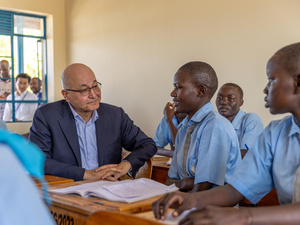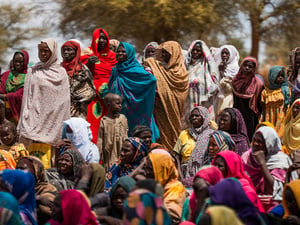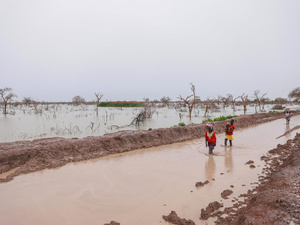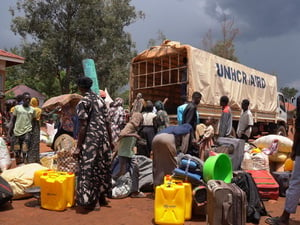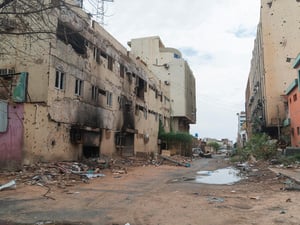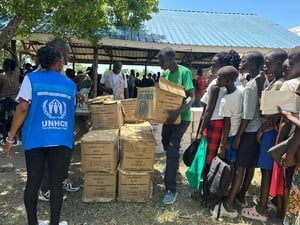UNHCR - more camps for South Sudanese refugee population in East Africa
UNHCR - more camps for South Sudanese refugee population in East Africa
As more South Sudanese refugees flee into neighbouring countries, UNHCR teams are working to establish a number of new camps and expand existing ones in neighbouring Uganda, Ethiopia and Kenya.
Since mid-December, when conflict erupted in South Sudan, over 86,000 South Sudanese have crossed into neighbouring countries. With people still arriving at a rate of around 1000 a day we are looking at the prospect of refugee numbers exceeding 100,000 by end January.
Inside South Sudan, people are reported to have moved to border areas, from where they can cross to neighbouring countries should the situation further deteriorate. To the south of Juba, just across the border from Uganda at Nimule there are now thousands of people. Others are reported in areas bordering Sudan and its neighbouring regions of East Darfur, South and West Kordofan.
According to government data there are now 46,579 South Sudanese refugees in Uganda. Ethiopia has so far received 20,624, and Kenya at least 8,900. An estimated 10,000 people have also crossed into Sudan's South and West Kordofan states, which are themselves facing armed violence. The government of Sudan has registered 1,371 of them as refugees while the rest are mostly nomads.
In Uganda, there is still serious overcrowding at the Dzaipi transit centre in Adjumani District in the country's north. People are contending with issues relating to hygiene, food and lack of water. Although some 10,000 people have so far been moved to the nearby Nyumanzi settlement Dzaipi, designed for 400 people, is still hosting over 20,000 refugees.
UNHCR is racing to transfer around 500 families daily to decongest Dzaipi transit center as more refugees arrive. We are meanwhile rehabilitating former sites in Nyumanzi and nearby at Baratuku where a primary school and health centre need to be upgraded.
Water is the most urgent of the challenges, with some of the recently moved refugees reporting that a wait of up to 4 days to get water while others are sleeping in line at water pumps with their jerry cans. Shelter and health are also problematic, with many people sleeping in the open.
Most of the newly arriving South Sudanese are under 18 years of age and many of them have already been asking for secondary and tertiary education opportunities. For children without close family members UNHCR is providing separate shelter and identifying foster caretakers within the community, but further support is still needed.
UNHCR is urging partners and other humanitarian organizations to assist in building up these settlements. In the meantime, we have created a second transit centre in the same area, with a capacity for 4,000 people, and where incoming refugees are now being now being taken.
All refugees relocated to the settlements around Adjumani are given basic relief items including blankets, mats, cooking equipment, jerry cans and materials to construct houses. They are also given small plots of land to erect their houses.
In Ethiopia and Kenya, where new camp development is also taking place, refugees are facing similar challenges in terms of clean water, health, sanitation, shelter and education. In Kenya in particular, we are seeing many children separated from their parents.
By setting up new camps and expanding existing ones in both countries, we will be in a better position to address the news of the growing refugee population. UNHCR currently needs a total of $US88 million to respond to the humanitarian crisis inside South Sudan as well as in the surrounding region.
For more information on this topic, please contact:
- In Nairobi: Kitty McKinsey (Regional) on mobile +254 735 337 608
- In Juba (on mission): Kisut Gebreegziabher on mobile. +211 928 067 699
- In Mbarara, Lucy Beck on mobile +256 77 271 013
- In Geneva, Adrian Edwards on mobile +41 79 557 9120
- In Geneva, Fatoumata Lejeune on mobile +41 79 249 34 83


